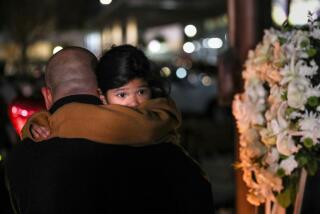Safeguarding Your Child : Rules for Living in a Dangerous World
- Share via
Authorities are offering tips to help parents protect their children. In the wake of seven attempted kidnapings reported at Orange County shopping centers recently and the highly publicized abduction and murder of 12-year-old Polly Klaas in Petaluma, parents can reduce the chances of victimization by teaching children some safety rules.
BROACHING THE SUBJECT
* Reassurance: Assure your children that they can be safe if they follow some simple rules and form good habits. The main thing for them to remember is never to go anywhere with anyone without your permission.
* Openness: Ask them to always confide in you, even if the subject feels uncomfortable.
* Strangers: Teach your children that there are good strangers and bad strangers. For example, police officers, salesclerks and teachers are people children should seek out if they are in trouble.
* Secrets: There are good secrets and bad secrets. Bad secrets include an adult ordering a child not to tell that he offered candy to go in his car, or that he touched the child in a private place.
PROFILE OF A MOLESTER
Among the several types of child molesters are non-family members who use force or violence against a child. They are almost always male. The recidivism of child molesters is among the highest of all crimes.
* How a victim is chosen:
The typical child molester seeks vulnerable children; he tends to gravitate to places where he can observe many children. These include schools, playgrounds, movie theaters, arcades, public restrooms, libraries, parks and public swimming pools.
* Who is at risk: He may prefer a certain type of child but will not confine himself to that type if he has a better opportunity to attack others.
SAFETY RULES
On the Street:
* Have your children walk or play with other children or trusted adults.
* Establish a call-back routine with your school to alert you if your children do not report for class.
* Do not allow your young children to walk outside after dark without an adult.
* Adopt a family code word. Instruct your children never to go with an adult who does not give the code word.
* Tell your children never to get into a car with a stranger.
* Teach children to walk against traffic if possible. This allows them to easily see a car stopping near them. Tell your children to run or yell if someone tries to force them to go somewhere.
* Never let a stranger photograph your children without your permission.
* Instruct children to tell you if they have been approached by a stranger.
In the house:
* Keep your doors locked, even during the day. Some molesters simply walk in. Do not open doors for strangers and instruct your children not to tell anyone at the door that they are alone.
* When answering the phone, your children should not give any information to strangers.
ESSENTIAL SKILLS
* Teach your children how and when to use 911 and how to use a public telephone.
* Teach them what to do if you become separated, especially in a crowd. They should seek help from people such as an usher, police officer or salesclerk. They should stay in one place if they get lost. You may also want to give your children a whistle to signal for help.
* Encourage your children not to keep secrets from you. If someone has been bothering them but has not tried any overt acts, you need to know about it.
IMPORTANCE OF PRACTICE
Play roles with your children to teach them how to respond. If properly prepared, they can automatically take the right action if in danger. It is important to keep up these practice sessions as children get older. For example, a 9-year-old may forget or ignore what he or she knew at age 7.
*
Sources: Los Angeles Police Department; Orange County Child Protective Services
More to Read
Sign up for Essential California
The most important California stories and recommendations in your inbox every morning.
You may occasionally receive promotional content from the Los Angeles Times.












![Vista, California-Apri 2, 2025-Hours after undergoing dental surgery a 9-year-old girl was found unresponsive in her home, officials are investigating what caused her death. On March 18, Silvanna Moreno was placed under anesthesia for a dental surgery at Dreamtime Dentistry, a dental facility that "strive[s] to be the premier office for sedation dentistry in Vitsa, CA. (Google Maps)](https://ca-times.brightspotcdn.com/dims4/default/07a58b2/2147483647/strip/true/crop/2016x1344+29+0/resize/840x560!/quality/75/?url=https%3A%2F%2Fcalifornia-times-brightspot.s3.amazonaws.com%2F78%2Ffd%2F9bbf9b62489fa209f9c67df2e472%2Fla-me-dreamtime-dentist-01.jpg)